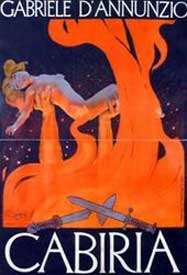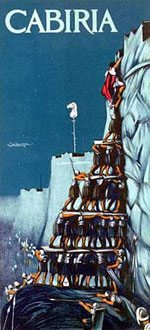 Giovanni Pastrone's early film classic Cabiria (Cabiria: Visione Storica del Terzo Secolo A.C.,1914) is set in the ancient world around the time of the Punic Wars.
Giovanni Pastrone's early film classic Cabiria (Cabiria: Visione Storica del Terzo Secolo A.C.,1914) is set in the ancient world around the time of the Punic Wars.
The first feature length film & the first epic film, it has been restored even to the point of providing it with its original 1914 piano score by Jacques Gautier. The story was concocted by Pastrone with help of the internationally famed novelist Gabriele D'Annunzio, whose name helped bring in the audiences of the era.
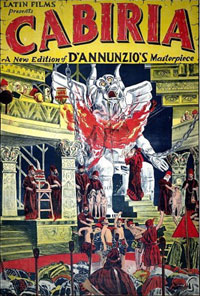 The director of photography, in charge also of special effects which pretty much carry the film to greatness, was Segundo de Chomon. The director of photography, in charge also of special effects which pretty much carry the film to greatness, was Segundo de Chomon.
The resultant film would be the central influence for ancient-world stories in cinema of the next many decades.
Cabiria profoundly influencing D. W. Griffith's Intolerance (1916) & DeMille's first version of The Ten Commandments (1923), besides many another biblical epic or less well remembered historical.
It cost a milliion lira to make Cabiria, the most expensive film of its day. Though occasionally tedius as a story, for visual impact of almost every scene is a miracle, whether filmed on wonderfully designed sets or in such locations as the Alps.
The child Cabiria (Carolina Catena) is at play & all is well with her family when without warning Mount Etna erupts in flame. In the chaos & terror, the servants, including Cabiria's nurse Croessa (Gina Maragnoni), by chance stumble onto the horded treasure of their master. Greed overcomes terror as they load up on treasure before fleeing the crumbling city.
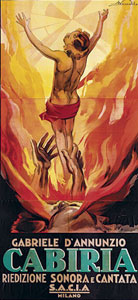 The centerpiece of Part I has been the volcanic eruption & the city's distruction. Part II finds all again calm. Cabiria is assumed dead, buried in the crumbled ruins, though she is safe, more or less, with her nurse, lucklessly kidnapped by Phoenician pirates. The centerpiece of Part I has been the volcanic eruption & the city's distruction. Part II finds all again calm. Cabiria is assumed dead, buried in the crumbled ruins, though she is safe, more or less, with her nurse, lucklessly kidnapped by Phoenician pirates.
In Carthage they are purchased at the slave market by the High Priest Karthalo (Dante Testa), who requires offerings to Moloch, the god who according to scripture received child sacrifices.
The centerpiece of Part II is the Temple of Moloch with a demon-god's wide open mouth as entryway. The Temple is conveyed through an incredible series of sets inside & out, capped off by the hideous idol that opens into an oven, into which fiery mouth children are thrown.
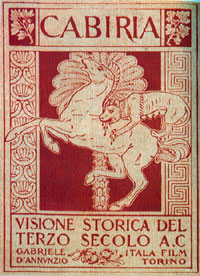 The third episode regards the arrival from over the mountain passes of the army of Hannibal (Emilio Vardannes), welcomed to Carthage for his promise of war against Rome. Fulvius (Umberto Mozzato) must get word of this threat to Rome. The third episode regards the arrival from over the mountain passes of the army of Hannibal (Emilio Vardannes), welcomed to Carthage for his promise of war against Rome. Fulvius (Umberto Mozzato) must get word of this threat to Rome.
If it sounds great so far, it is; even so, generally the characters never show much individual vitality, so that it all becomes a display of costumes & sets.
Cabria, though the title character, is scarsely more than a cypher in the story. Nubian slaves are played by white people in blackface, a most annoying element that spoils every scene they're in.
More picky problems could be cited. Still, in general, any weaknesses of Cabiria are forgiveable in contrast to its achievements.
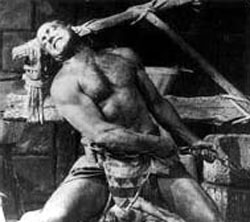 As the chapter ends, an heroic figure, Maciste (Bartolomeo Pagano), the slave-companion of Fulvius, is chained to a millstone, ostensibly for life, by the villainous High Priest. As the chapter ends, an heroic figure, Maciste (Bartolomeo Pagano), the slave-companion of Fulvius, is chained to a millstone, ostensibly for life, by the villainous High Priest.
Maciste is an Italian pulp hero who would recur in cinema many, many times as a Hercules stand-in, & here is the character's filmic debut.
He is so like Hercules that several Maciste films of the "sword & sandal" era were dubbed into English, turning him into Hercules.
Part IV regards Rome's assault on Syracuse, defended with the help of Hannibal. One of the great sequences will be the building of the pyramid of footsoldiers & shields to reach the top of the city wall.
A semi-legendary, elderly Cartheginian inventor, Archimede (Enrico Gernelli), creates marvelous machines of war to defend city walls. He devises even a death ray by which he sets Fulvius's Roman fleet ablaze.
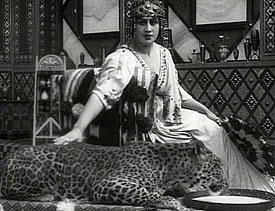 The burning, sinking fleet is, of course, the central image for Part IV. The story picks up again with Part V, when Fulvius, his fleet destroyed, washes ashore a great distance away. The burning, sinking fleet is, of course, the central image for Part IV. The story picks up again with Part V, when Fulvius, his fleet destroyed, washes ashore a great distance away.
He is in fact near the original home of Cabiria. Through him Cabiria's family learns that she is alive. He promises the family to seek her out.
Cabiria has been living under the protection of Princess Sophonisba (Italia Almirante-Manzini), who possesses a leopard as a pet.
The princess has been married off to gain political alliance against Rome. This marriage to an old & powerful man is an awful, loveless match, & the princess lives with secret sadness.
Also entering the story is Massinissa (Vitale Di Stefano) the Numidian bandit-knight who dreams of kingship.
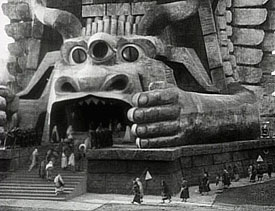 Ten years pass before Fulvius has a chance to track down Cabiria & find his friend Maciste. Ten years pass before Fulvius has a chance to track down Cabiria & find his friend Maciste.
Although Maciste has been turning a grindstone for a decade, he is still unbroken when Fulvius liberates him.
Now they must find Cabiria, who has grown to be a young women serving Sophonisba & going by the name Elissa (Lidia Quaranta).
Elissa is to be returned to the Temple of Moloch, for Sophonisba, now Queen of Carthage, had been warned in a d ream that Carthage would otherwise fall due to the anger of the god.
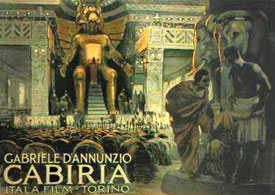 Karthalo, the high prieset of this temple who has never forgiven having his intended sacrifice reprieved, is also he that kept Maciste in chains. And Maciste welcomes the opportunity of revenge. Karthalo, the high prieset of this temple who has never forgiven having his intended sacrifice reprieved, is also he that kept Maciste in chains. And Maciste welcomes the opportunity of revenge.
In the process, Fulvius & Maciste, "the two audacious heroes," will attempt the rescue of Cabiria/Elissa.
But it will be our heroes who save Elissa. Rather, it is Queen Sophonisba herself who sets the slave girl free. Though in general a femme fatale figure, she redeems herself utterly.
The queen takes poison so as not to become Rome's booty, & it is her last act as Queen to liberate Elissa. The actress then gets to have one of the hammiest stretched out death scenes of all silent cinema, while everyone else we liked lives happily ever after.
copyright © by Paghat the Ratgirl
|
